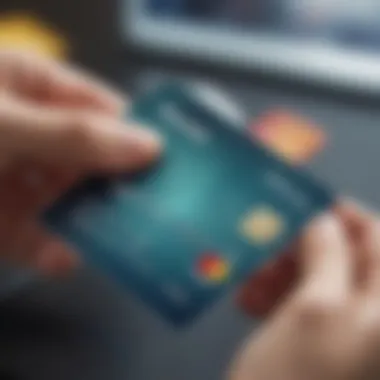Exploring the Radius Debit Card: Features and Insights


Intro
In today’s rapidly changing financial landscape, understanding the tools at your disposal is crucial. One of those tools is the Radius Debit Card, which presents a unique blend of features tailored for both seasoned investors and everyday consumers. This article will explore the intricacies of the Radius Debit Card, offering a compact yet comprehensive overview that touches on** its distinctive attributes, the benefits it brings to users, and the limitations it may impose**. With a focus on real-world applicability and consumer insights, we aim to equip you with the information necessary to make informed financial choices.
Financial literacy isn’t just a buzzword; it’s a necessity in the modern world. As we embark on this journey through the features and functionalities of the Radius Debit Card, we’ll unveil various concepts that underpin its value to users, all while ensuring a straightforward yet engaging exploration. So, whether you’re looking to enhance your financial acumen or simply curious about what Radius Debit Card can offer, you’re in the right place.
Key Financial Concepts
Terminology Breakdown
When discussing financial products like debit cards, it's important to understand some key terms that come into play. Here’s a breakdown for clarity:
- Debit Card: This is a plastic card that allows you to access funds directly from your bank account.
- Transaction Types: Refers to the various forms of payments you can make using your debit card, including point-of-sale purchases and online transactions.
- Security Measures: These are safeguards in place to protect your financial information, including encryption and fraud monitoring.
Understanding these terms lays the foundation for a deeper exploration of the Radius Debit Card and its functionalities.
Understanding Market Trends
The market for debit cards is evolving. As consumers seek more flexibility in how they manage their finances, innovative products like the Radius Debit Card emerge. Banks are no longer just places to store money; they’re evolving into financial partners who help consumers navigate their spending and savings habits.
Observing trends such as the increasing demand for mobile banking solutions or the shift towards cashless transactions gives insight into why Radius is tapping into these advancements. More and more, customers desire features that facilitate not only transactions but also manage personal finances better.
Product Analysis
Comparative Ratings
When evaluating the Radius Debit Card against competitors, it's essential to consider various factors:
- Fees: Does it have an annual fee? What about transaction costs?
- Rewards: Are there cash-back or point systems that add value?
- Accessibility: How easy is it to access funds at ATMs or through online services?
In simple terms, weighing these factors can help you understand if Radius meets your needs, especially compared to other options available.
Expert Reviews
Industry experts weigh in on products like the Radius Debit Card to guide potential users. Their analysis covers aspects such as user experience, security features, and the overall convenience. Many experts discuss how Radius aims to blend practicality and innovation, presenting solutions that address core financial needs. Positive reviews often highlight its user-friendly interface and the robust security measures in place, while critiques may bring to light limitations or areas for improvement.
"Great financial tools make life easier. With functionalities that align with user needs, Radius Debit Card is increasingly being recognized in the financial ecosystem."
In sum, this section emphasizes the importance of seeking out expert opinions while considering various financial products.
By keeping these key points in mind, you will have a better framework to understand what the Radius Debit Card offers and where it stands in the broader market.
Foreword to the Radius Debit Card
The Radius Debit Card has become a notable player in the realm of debit cards, merging functionality with modern banking needs. Its significance lies not only in its features but also in how it caters to today’s consumers. As more individuals and businesses lean towards cashless transactions, understanding what this card offers becomes paramount. This section aims to highlight the fundamental aspects of the Radius Debit Card, its functionalities, benefits, and some considerations for thoughtful users.
Definition and Overview
The Radius Debit Card represents a financial tool that allows users access to their funds electronically while offering several enhancements over traditional debit options. At its core, this card serves as a bridge between customers' bank accounts and their spending practices, facilitating transactions with a simple swipe or tap. Its significance also stems from its flexibility and adaptability to different user needs, making it a popular choice among this digital age's savvy savers and spenders alike.
Historical Background
Understanding the roots of the Radius Debit Card provides insight into its development and purpose.
Development Timeline


The inception of the Radius Debit Card can be traced back to a growing demand for improved banking solutions. As technology advanced, financial institutions recognized the need to modernize their offerings. Initially, it was just your average plastic card, but over time, it evolved. The key characteristic of the development timeline is the incremental advancements tailored to enhance user experience. This range from the introduction of contactless payment options to the seamless integration with popular payment platforms, establishing the Radius Debit Card as a competitive product in the market. Customers quickly found its unique feature of real-time spending notifications particularly beneficial, allowing them to keep a closer eye on their finances.
Market Prolusion
Upon entering the market, the Radius Debit Card set out to redefine the user experience associated with debit transactions. The marketing strategies employed emphasized the importance of security and ease, which resonated with a wide audience. A notable characteristic of this introduction was the focus on tech-savvy millennials and Gen Z. Users of these demographics value convenience in their shopping habits, making the Radius Debit Card's design and functionality a favorable choice. A unique fixture during its launch was the promise of lower fees compared to conventional debit cards, making it an attractive option. However, some early users pointed out complexities in understanding the fee structures, which led to a mixed reception during the first phase of its rollout.
Understanding the Core Features
Understanding the core features of the Radius Debit Card is not just an academic exercise; it’s a vital component for anyone looking to navigate today’s financial landscape. This section serves to dissect the functionality, rewards, and incentives tied to using this card. A sound grasp of these features can significantly influence a user's financial behavior and habits, equipping them with the tools necessary to make informed decisions about their spending and saving strategies.
Card Functionality
The Radius Debit Card is built with practicality and ease of use in mind. At its core, it provides seamless access to funds, allowing users to conduct transactions, both online and in-store. These transactions are usually processed swiftly, which enhances the convenience factor for users who don’t want to wait in line or deal with cumbersome account transfers. The card functions like a standard debit card but with some enhanced features that cater to modern consumer needs.
Moreover, users can keep track of their finances through comprehensive online tools, aiding in budgeting efforts. This feature alone can help demystify personal finance for users and encourages better financial habits. It also integrates budgeting tools which can categorize spending. In a sense, it acts as a financial planner wrapped in a card.
Rewards and Incentives
Delving into rewards and incentives, this aspect elevates the value offered by the Radius Debit Card. Users are not merely using plastic for transactions but are gaining rewards that can be redeemed in various forms. The Radius Debit Card employs a system that gives users a reason to choose it over mundane traditional debit cards.
Cashback Programs
One of the standout features is the cashback program. This program allows users to earn a percentage back on their purchases, effectively reducing the overall cost of goods and services. This characteristic is prized among consumers who wish to maximize their spending power. It creates a win-win situation where spending equates to savings, essentially turning routine shopping trips into rewarding experiences.
Unique to the Radius Debit Card is the tiered cashback structure where different merchants might offer varied cashback rates. As a result, users can prioritize their spending based on where they can get the best deal, making it a quite advantageous aspect of the program. However, it is essential for users to stay updated with the changing rates, which can be a slight drawback if they miss relevant promotions or opportunities.
Loyalty Benefits
Loyalty benefits present another compelling dimension to the Radius Debit Card experience. These are designed to foster long-term relationships between the card issuer and the user. By utilizing points systems or offering exclusive discounts at partnered retailers, the card develops a sense of community and belonging among users.
One key characteristic of loyalty benefits is that they encourage repeated patronage. For example, a user who shops frequently at a partner retailer may accumulate points much quicker, resulting in discounts or special offers that are not available to other shoppers. Such a feature can enhance user satisfaction but can also lead to the common pitfall of overspending just to accumulate more points. Note that understanding the terms associated with these loyalty benefits is crucial to leveraging them effectively.
Key Advantages
The Radius Debit Card positions itself as a compelling alternative to traditional debit cards, thanks to a range of advantages that appeal to various users. Understanding these key benefits is crucial for potential users who are looking to optimize their banking experience. The advantages not only enhance the day-to-day utility of the card but also paint a broader picture of how modern financial products are evolving to meet consumer needs.
Convenience of Use
In today's fast-paced world, convenience is king. Radius Debit Card prides itself on usability. Users can link the card directly to their checking account, making transactions smooth and hassle-free. This direct linkage removes the need for transferring funds or managing multiple accounts, simplifying the financial life of users.
Additionally, the card supports various payment methods, whether purchasing in-store or online. Payments can be made by swiping, dipping, or tapping the card, giving flexibility in how transactions are completed. Moreover, the integration with mobile wallets such as Apple Pay and Google Wallet adds another layer of ease. Just a quick tap on your smartphone, and you're all set.
Often, individuals find themselves in need of quick access to cash. With Radius, the ATM locator feature offers users the ability to find nearby ATMs, reducing hunting time. It’s these little conveniences that can make a significant difference in making or breaking a financial experience.
Transaction Flexibility
Transaction flexibility is another strong point for Radius Debit Card. The card enables users to manage their spending easily, with the advantage of tracking transactions in real-time through a mobile app. This level of transparency means cardholders can keep a close eye on their finances without any guesswork or surprises at the end of the month. Orders can be placed using the card for recurring payments like Netflix or subscription services, which means users can set it and forget it. It helps in maintaining a clear budget and knowing where every dollar is going.
What really stands out is the diverse range of transaction types supported. Purchases can be made using the card for everyday items ranging from groceries to online shopping. That flexibility can cater to a variety of lifestyles, whether one prefers in-person shopping or the online route. The added feature of budgeting tools enables users to categorize spending, which ultimately empowers them to adjust their spending habits accordingly and plan for future expenses.
Customer Support Options
When things go awry, effective customer support can make all the difference, and Radius offers a robust support system. Users can reach out through multiple channels, including phone, chat, and email. Support is available 24/7, addressing any issues with the card, such as transactions under review or lost cards, ensuring that users feel secure and valued.
Additionally, the Radius Debit Card includes comprehensive online resources. A dedicated FAQ section tackles common questions around features, security, and account management. This self-service option often provides answers more quickly than waiting on hold for a customer service representative. Overall, the combination of immediate support via live channels and useful documentation creates a user-friendly experience that fosters confidence in using the card.


"A great card is not just about the transaction; it's about the experience behind it. Radius offers both."
In essence, the Radius Debit Card's key advantages — convenience of use, transaction flexibility, and robust customer support — come together to create a compelling offering for modern consumers. From streamlining daily transactions to providing reassurance through customer services, it stands out as a suitable choice for those who want to manage their finances smartly.
Comparative Analysis with Traditional Debit Cards
When looking at the Radius Debit Card, it’s critical to reflect on how it stacks up against traditional debit options. The comparisons go beyond mere appearances and functionality; they touch on cost, convenience, and the overall user experience. This analysis helps potential users appreciate the value this card brings to the table. In a market saturated with debit cards, understanding these variances is crucial for making an informed choice.
Cost-Effectiveness
One of the standout features of the Radius Debit Card is its cost-effectiveness. Traditional debit cards often come with monthly fees, ATM withdrawal charges, and unexpected miscellaneous costs that can pile up over time. In contrast, the Radius Debit Card is designed to be user-friendly and low-cost.
Here are some considerations regarding its cost-effectiveness:
- No Monthly Fees: The card typically does not impose a monthly fee, which is a breath of fresh air, especially when one considers all the costs that accumulate with conventional banking.
- ATM Fee Reimbursement: It often covers ATM fees, provided the withdrawal is done within their network or at certain preferred ATMs. This feature saves users a good chunk of change, ensuring that your money goes further.
- Third-Party Fees: Traditional debit cards might add charges for balance inquiries or overdraft protection. The Radius card generally avoids these fees, providing a clearer picture of your spending without the hidden charges.
This card, therefore, can be particularly appealing for budget-minded individuals, including students or those who may not have a stable income. It strips away the barriers that conventional banking puts in place, making it easier to grasp usage costs.
Rewards Structuring
On the rewards front, the Radius Debit Card offers a different narrative compared to its traditional counterparts. Many conventional debit cards stress low rewards with high-efforts; while some have basic cashback programs, these are often buried under complex terms.
- Cashback on Purchases: The Radius Debit Card prides itself on a more straightforward cashback system. For example, you might see an offer for 1% cashback on all purchases, which reflects a more user-centric design.
- Targeted Offers: Distinguishing itself further, the card often provides rewards that are tailored to individual spending habits. This customized approach can yield higher rewards for those who frequently shop at certain retailers or categories, unlike traditional cards where rewards seem like chasing a mirage.
- Simple Redemption Process: Unlike some traditional cards that complicate the rewards redemption with long procedures, Radius simplifies the process. When it comes time to cash in those rewards, an easy interface awaits, reducing the friction notoriously found in typical debit systems.
Ultimately, this straightforward rewards structuring can make for a more gratifying customer experience. Consumers can better calculate how they are earning, making financial choices less of a guessing game.
In the realm of personal finance, clarity and simplicity reign supreme, especially for those steering through tight budgets or uncertain incomes.
In summary, the Radius Debit Card brings a refreshing perspective when you hold it up against the traditional debit card landscape. By prioritizing cost-effectiveness and designing an enticing rewards structure, it speaks to modern users looking for value without the headaches that often come with legacy banking systems.
Limitations and Considerations
When one contemplates a financial product like the Radius Debit Card, understanding its limitations is as crucial as recognizing its strong suit. A well-rounded view of these potential drawbacks prepares users, be it everyday consumers or financial advisors, for any pitfalls. Transparency in this regard not only enhances financial literacy but also fosters informed decisions.
Fee Structures
Examining the fee structures is essential when assessing any debit card. The Radius Debit Card does offer features that appeal to many, but it also carries fees that might pose challenges for users.
- Monthly Maintenance Fees: While some users may find free options, there could be monthly fees that can chip away at the benefits offered.
- Transaction Fees for Non-Network ATMs: The convenience of cash withdrawal can be marred by the heavy fees attached when utilizing ATMs outside of the affiliated network. It’s worth considering how often a user would rely on these external ATMs.
- Overdraft Fees: Some debit card users might encounter overdraft situations, leading to unexpected charges. While it's advisable to maintain a budget and remain within limits, these fees could still catch users off guard during tight financial moments.
In terms of long-term usage, these fee structures can accumulate significantly. Careful budgeting and a clear understanding of where fees apply will aid users in avoiding unnecessary costs.
Restrictions on Use
Another element to consider is the restrictions on how the Radius Debit Card can be utilized.
- Geographic Restrictions: Users might find that their Radius Debit Card imposes limitations based on geographical locations. Certain transactions may not process if users are traveling abroad or in areas where the network isn't established.
- Merchant Limitations: Not every merchant may accept the Radius Debit Card, which can be a headache, particularly for those who shop frequently at smaller or local establishments.
- Withdrawal Caps: The debit card may also impose limits on daily cash withdrawals which could be inconvenient for users who need access to large sums regularly.
These restrictions can shape a user's experience substantially. Therefore, recognizing potential limitations in advance allows for better planning, whether it’s using the card for daily expenses, travel, or automated payments.
"A wise personal finance habit is knowing the charges and limitations of your tools. Awareness paves the way for sound financial decisions."
As we explore the Radius Debit Card, weighing both its features and its limitations gives a clearer picture. Balancing benefits against these considerations will help users engage with their finances in a smarter, more aware way.
Security Measures and Protocols


In an age where digital transactions are as ordinary as morning coffee, the significance of solid security measures cannot be overstated. For any cardholder, especially those considering the Radius Debit Card, understanding the security protocols in place becomes vital. These measures ensure not just safety from fraud but also the safeguarding of personal information.
Fraud Protection Methods
With the rise of online shopping and e-banking, fraudulent activities have unfortunately found a fertile ground to grow. Organizations, including those behind the Radius Debit Card, have stepped up their game by implementing various fraud protection methods. Some of the most noteworthy include:
- Real-time monitoring: A system that alerts the customer of any unusual spending patterns. For instance, if a user typically spends $50 a week but suddenly there's a charge for $500 in another country, an alert is generated immediately.
- Two-factor authentication: This means cardholders must provide two forms of identification before gaining access to their account. It could be something they know, like a password, combined with something they have, such as their phone or email.
- Zero liability policy: This policy assures cardholders that they won’t be held responsible for unauthorized transactions, provided they report them quickly. This builds confidence in users that their funds are protected, no matter what can happen online.
Incorporating these methods significantly reduces the chances of financial loss. However, users still need to stay vigilant and report any suspicious activity right away.
User Privacy Controls
Equally as important as fraud protection is the realm of user privacy controls. Modern consumers often worry about how their data is used by financial institutions. The Radius Debit Card addresses these concerns through several robust measures:
- Data encryption: User information is safeguarded through advanced encryption techniques, ensuring that sensitive data is unreadable to unauthorized individuals. The risk of data breaches is minimized when encryption is properly employed.
- Control over personal information: Users have the authority to decide what information they share and with whom. This transparency fosters a sense of security. For instance, if a customer chooses to opt out of certain marketing emails, they can do so, underscoring respect for personal boundaries.
- Privacy policies: These documents help explain how customer data is collected, used, and protected. Knowing this can alleviate concerns and provide clarity, making users more confident when engaging with their accounts.
"Security is not just a feature; it’s a fundamental right for every user. Understanding what safeguards are in place can make the difference between a satisfied customer and a potential victim of fraud."
By enhancing privacy through these controls, cardholders can use the Radius Debit Card services without constantly worrying about how their personal details are being handled. This balance between security measures and user privacy not only helps in creating a trustworthy brand image but also empowers users, allowing them to transact with peace of mind.
User Experience and Testimonials
In today's fast-paced financial landscape, user experience often trumps the technical specifications of a product, even one as straightforward as a debit card. The evaluations and stories shared by actual users provide a wealth of information about how a card performs in everyday life. These testimonials not only reflect the benefits and drawbacks but also reveal the tacit expectations of the consumer. Thus, grasping user experiences with the Radius Debit Card becomes crucial for both potential adopters and industry stakeholders.
Positive Feedback
Many users extol the virtues of the Radius Debit Card, primarily praising its user-friendly interface and seamless integration with digital wallets. Customers often highlight how easy it is to navigate their account through the accompanying app. The straightforward design helps folks manage their finances without feeling overwhelmed. One user remarked, "I never knew budgeting could be so simple," indicating how the card's features can streamline personal financial management.
Moreover, the cashback and rewards programs stand out as a significant hit among users. Frequent transactions often result in tangible rewards that enhance the overall experience. Some customers have gone as far as to say that the various cashback percentages they receive make everyday purchases feel rewarding rather than routine. Essentially, users feel appreciated for choosing the card, turning mundane spending into a pleasantly gamified experience.
Pinned testimonials often denote a strong sentiment towards the customer service as well. Rapid response times and effective solutions provided by service representatives create an atmosphere of trust and reliability. One reviewer noted, "I had an issue with my card one evening, and within minutes, I was speaking with a helpful representative. No long hold times—just quick resolutions!" The emphasis on supportive customer interactions highlights how positive user experiences greatly elevate the overall reputation of Radius.
Areas of Improvement
Nevertheless, the experience can be far from idyllic. Every user account articulates areas where the Radius Debit Card could level up. One common theme is the need for improvements in transaction processing times. While many transactions occur without a hitch, others experience delays that can be frustrating. A user mentioned, "I sometimes find myself waiting longer than usual for the app to reflect my transactions, which can lead to confusion about my spending."
Similarly, the limited acceptance of the card at certain retail locations has been called out by several customers. Some point out that while big-name retailers may embrace the card, smaller vendors often do not. Customers have expressed concern that this limited acceptance hampers spontaneity, stating, "I really wanted to use my Radius card during a weekend trip, but it seemed like every quaint cafe or boutique didn't take it."
Lastly, there are users who seek more educational resources about the card's benefits and effective usages. Not every customer is financially savvy, leading to confusion over optimizing rewards and fees. A prospective user reflected, "I wish there was a clear guide detailing how to maximize my rewards—getting started can feel a bit like fumbling in the dark."
End and Future Outlook
The conclusion of this analysis encapsulates not just the core findings, but also the potential landscape for the Radius Debit Card as it navigates through an evolving financial world. In an era where consumers demand more flexibility and value from their banking products, Radius emerges as a formidable player. The ongoing advancements in technology and shifting consumer behavior are pivotal elements that will shape its journey forward.
Summary of Key Points
In examining the Radius Debit Card, several critical features and aspects stand out:
- Functionality: The Radius Debit Card operates seamlessly in both online and offline transactions, facilitating ease of use.
- Cost Efficiency: Its low or nonexistent fees cater to consumers looking for economical banking solutions, offering a stark contrast to many traditional debit cards.
- Rewards Programs: Cashback incentives and loyalty benefits add a layer of value, making spending more rewarding.
- Security Measures: Advanced fraud protection and user privacy controls create a safer banking atmosphere for users.
- User Feedback: Testimonials showcase a mixed bag, highlighting both satisfaction and areas where users expect improvement, presenting key insights for future enhancements.
In sum, the Radius Debit Card not only aligns with modern consumer needs but also provides a blueprint for financial institutions aiming to innovate.
Potential Market Developments
As we look towards the future, several trends could significantly influence the Radius Debit Card's role in consumer finance:
- Rise of Digital Banking: With the growing preference for online and mobile banking, Radius may increase its digital offerings to capture this market. Integration with payment apps could become a priority, allowing users to manage finances holistically.
- Sustainability in Finance: As environmental concerns grow, financial products that promote sustainable spending could become appealing. Radius might consider launching offers that reward eco-friendly purchases, tapping into a conscientious consumer base.
- Personalization of Services: Tailored banking experiences are becoming a norm. Future iterations of the Radius Debit Card could include more personalized financial advice, alerts relevant to spending habits, and customizable rewards to increase user engagement.
- Increased Security Protocols: As technology progresses, so do the tactics of cybercriminals. Anticipated advancements in biometric security features or adaptive fraud detection systems may bolster user trust.
- Expansion into International Markets: There is an avenue for Radius to extend its reach by adapting its card services for international users, especially with the rise of global e-commerce.
These trajectories underscore not only the potential of the Radius Debit Card but also deliver a vision of how it can continue to meet and exceed user expectations, adapting to a dynamic financial environment.
"In the ever-changing landscape of financial technology, adaptability is crucial for survival and growth."
Understanding these insights enables potential users to make educated decisions, tailoring their choice of financial tools to suit their needs and aspirations.















